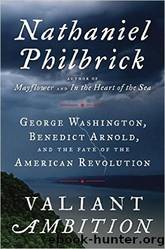Valiant Ambition: George Washington, Benedict Arnold, and the Fate of the American Revolution by Philbrick Nathaniel

Author:Philbrick, Nathaniel [Philbrick, Nathaniel]
Language: eng
Format: epub
Tags: History, Biography, War
ISBN: 9780525426783
Amazon: 0525426787
Goodreads: 26109390
Publisher: Viking
Published: 2016-05-10T07:00:00+00:00
By then he had received a second message from John André. Like Washington prior to Arnoldâs court-martial, Clinton was not pleased by Arnoldâs assumption that the two of them were equals, and he issued the equivalent of Washingtonâs earlier rebuke. André informed Arnold that his commander âwishes to apprise you that he cannot reveal his intentions as to the present campaign, nor can he find the necessity of such a discovery or that a want of proper degree of confidence is to be inferred from his not making it.â The onus at this point was not on the British but on Arnold, and it was up to him to find that âone shining strokeâ by which they might âaccelerate the ruin to which the usurped authority is verging and . . . put a speedy end to the miseries of our fellow creatures.â
What Arnold needed to do, André insisted, was to secure a âconspicuous commandâ in Washingtonâs army. If, for example, he was able to orchestrate the surrender of, say, five to six thousand soldiers, Clinton would be willing to reward him with âtwice as many thousand guineasâânot a bad sum, even by Arnoldâs standards.
But as Clinton was well aware, Arnoldâs current injuries precluded him from active command. The American general was, whether he admitted it or not, damaged goods from the British perspective, and Clinton was not about to guarantee the rewards that Arnold clearly felt were his due. His well-publicized problems in Philadelphia further reduced his value. âWhatever merit this officer might have had,â Clinton later wrote, âhis situation . . . made him less an object of attention.â
Arnold, ever thin-skinned, sensed as much, and on July 11 Stansbury reported that Andréâs earlier letter was ânot equal to his expectationsâ and that âhe found by the laconic style and little attention paid to his request that the gentleman appeared very indifferent respecting the matter.â Instead of sending along any additional information, Arnold provided Stansbury with a shopping list from Peggy for various types of cloth and ribbon. Was Arnold mocking Andréâthe officer who had once made Peggy a dress?
Toward the end of July André sent a letter that was almost apologetic. âI am sorry any hesitation should still remain,â he wrote, âas I think we have said all that the prudence with which our liberality must be tempered will admit.â In early August, Stansbury forwarded a verbal message from Arnold in which he insisted that although âhe wished to serve his country in accelerating the settlement of this unhappy contestââaccording to Arnoldâs self-referential logic, it was possible to serve his country by being a traitor to itââyet he should hold himself unjust to his family to hazard his all on the occasion and part with a certainty (potentially at least) for an uncertainty.â In other words, André had so far failed to meet Arnoldâs monetary requirements.
On August 16 André appealed directly to Peggy. âIt would make me very happy to become useful to you here,â he wrote. âYou know the Mischianza made me a complete milliner.
Download
This site does not store any files on its server. We only index and link to content provided by other sites. Please contact the content providers to delete copyright contents if any and email us, we'll remove relevant links or contents immediately.
| Afghan & Iraq Wars | American Civil War |
| American Revolution | Vietnam War |
| World War I | World War II |
Waking Up in Heaven: A True Story of Brokenness, Heaven, and Life Again by McVea Crystal & Tresniowski Alex(37788)
Empire of the Sikhs by Patwant Singh(23074)
We're Going to Need More Wine by Gabrielle Union(19034)
Hans Sturm: A Soldier's Odyssey on the Eastern Front by Gordon Williamson(18575)
Leonardo da Vinci by Walter Isaacson(13318)
The Radium Girls by Kate Moore(12018)
Tools of Titans by Timothy Ferriss(8369)
Educated by Tara Westover(8047)
How to Be a Bawse: A Guide to Conquering Life by Lilly Singh(7472)
Permanent Record by Edward Snowden(5839)
The Last Black Unicorn by Tiffany Haddish(5629)
The Rise and Fall of Senator Joe McCarthy by James Cross Giblin(5275)
Promise Me, Dad by Joe Biden(5144)
The Wind in My Hair by Masih Alinejad(5092)
A Higher Loyalty: Truth, Lies, and Leadership by James Comey(4954)
The Crown by Robert Lacey(4807)
The Iron Duke by The Iron Duke(4349)
Joan of Arc by Mary Gordon(4101)
Stalin by Stephen Kotkin(3957)
